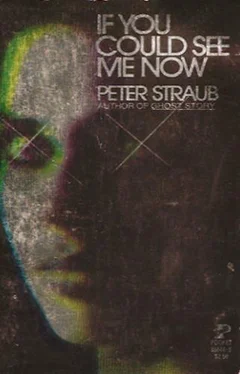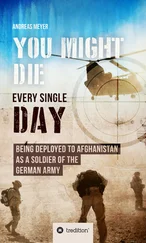It was two minutes past twelve. She had not come. The twenty-first of July had slipped into the past and she was not coming. She would never come. She was dead. I was stranded alone in only the human world. My guilt, moving under some impetus of its own, shifted hugely within me and came to a new relationship with my body.
I could not move. I had invented it all. I had seen nothing at the edge of the fields — nothing but my hysteria. I pulled the jacket tightly around me, obeying a reflex left over from childhood.
The shock endured for hours. By the time my trousers had begun to dry, I realized that my legs and feet had gone to sleep, and I leaned forward and bent my knees with my hands. intense pain arrowed out from my knees. I was grateful enough for it to try to stand. For a time I drowned my awareness in pain, moving awkwardly on someone else’s legs. Then I sat on one of the stone steps and looked again into loss. I could not cry: too much of the loss was of myself. Whatever I was going to be, whenever I could think about becoming something I could call myself, I was going to be different. I had made up a self which relied on the possibility of Alison Greening for its shadings, and now I felt like a Siamese twin whose other half had been surgically severed, cast away. The guilt which I had carried for twenty years had drastically altered its dimensions, but I could not tell if it had grown larger or smaller.
I was going to have to live.
I spend the entire night by the quarry’s side, though I knew from the moment I had seemed to fall back to earth — even before I had looked at my watch — that Alison-Greening was gone from my life for eternity.
During the last hour I spent mourning Alison’s second and final departure from my life, I was able to think about Arden and what had been happening there. Duane, Polar Bears, Paul Kant, myself. How after twenty years we had come together again in a tragic landscape. How we had all been marked by women. I saw the patterns tying us together, like Zack’s “lines of force.”
And I saw something else.
At last I understood that the murderer of the girls had been my cousin Duane. Who hated women more than any other man I had ever met, who had probably planned the murders of the girls who resembled Alison Greening from the day I had written him that I was coming to Arden. Duane’s were the old Coke bottles, the axes, the doorknobs: Zack must have stolen the one I had seen from wherever Duane had hidden them.
Sitting by the quarry’s side, still numb with the shock of loss, I saw it with a brisk, heartless clarity. Alison gone, it could only be Duane. And his daughter had feared this, I saw — she had run from any discussion of the girls’ deaths. What I had taken for a desire to appear more callous (therefore, she imagined, more adult) than she was made even more sense, given the fear that her father was a killer. She had really rebuffed any conversation about the dead girls.
I stood up: I could walk. A kind of strength blessed me. An entire era of my life, like a geologic period, was coming to an end — it would end with what I was going to have to do. I did not have the whisper of an idea of what I would do after that.
I walked down the side of the hill and found my shoes. In one night they had gone dead and curling, and when I forced my feet into them, the inner soles felt like the hides of dead lizards. They seemed not to fit, to have been shaped by another man.
When I stepped onto the highway I saw a high rattling truck coming toward me from the direction of Arden. It was a blood relative of the truck from which I had fled the previous night; I stuck out my hand, thumb up, and the man beside the wheel pulled up beside me. From the truck floated the earthy smell of pigs.
“Mister?” said the old man behind the wheel.
“My car broke down,” I said. “I wonder if you’re going anywhere near Norway Valley?”
“Hop yourself right in, young feller,” he said, and leaned across to open the door for me.
I climbed in beside him. He was a wiry man in his mid-seventies, with white hair that stuck up like a scrubbing brush. On the steering wheel his hands were the size of steaks. “Up early,” he said, not quite making it a question.
“I’ve been traveling a long time.”
He started the truck rolling again, and its whole rear section began jouncing and squealing.
“Are you actually going into the valley?”
“Sure,” he said. “I just been taxing a load of porkers into town, and now I’m going home. My boy and me farm a piece of land about eight-ten miles down the valley. You ever been that way?”
“No,” I said.
“It’s nice. It’s real nice down there. Don’t know what a healthy young feller like you is doing bumming around the country when you could settle down on the best farmland in the whole state. Man wasn’t born to live in cities, way I see it.”
I nodded. His words unlocked in me the knowledge that I was not going to return to New York.
“I reckon you’re a salesman,” he said.
“Right now I’m between jobs,” I said, and earned a bright look of curiosity.
“Shame. But you vote Democrat, we’ll get this country back on its feet and young men like you will have jobs again.” He squinted into the road and the rising sun, and the bouncing truck sent wave after wave of pig over us. “You remember that, now.”
When he turned the truck into the valley road, he asked just where I wanted to go, exactly. “You might think about coming all the way with me, and we could set you up with a good cup of coffee. What say?”
“Thanks, but no. I’d like you to drop me off at Andy’s.”
“You’re the boss,” he said, perfectly equable.
Then we were slowing down before Andy’s gaspumps. The seven o’clock sunlight fell on the dust and gravel. As I pulled down the door handle, he turned his brush-topped head slyly toward me and said, “I know you were fibbing me, young man.”
I just looked at him in surprise, wondering what he could have read in my face.
“About your auto. You don’t have any auto, do you? You’ve been thumbing your way right along.”
I met his smile. “Thanks for the ride,” I said, and stepped down from the cab and the thick odor of pigs into warm light. He rattled away, going deeper into the valley, and I turned to walk across the gravel and climb the steps.
The door was locked. I peered in through the glass and saw no lights. Andy had no CLOSED sign on the door, but I looked at the bottom panel of glass behind the screen and saw a dusty card which said Mon-Fri 7:30-6:30, Sat 7:30-9:00. I pounded on the screen door, rattling it. After forty seconds of steady pounding, I saw Andy waddling toward me through the crowded tables, peering at me to figure out who I was.
When he got close enough to identify me, he stopped. “We’re closed.” I motioned him forward. He shook his head. “Please,” I shouted. “I just want to use your phone.”
He hesitated, and then came slowly up toward the door. He looked worried and confused. “You got a phone down at Duane’s place,” he said, his voice muffled by the glass.
“I have to make a call before I get there,” I pleaded.
“Who you going to call, Miles?”
“The police. Polar Bears Hovre.”
“What’re you gonna say to the Chief?”
“Listen in and you’ll know.”
He came the necessary two steps and put his hand on the lock. His face jerked, and then he slid the bolt and opened the door. “Screen door’s still locked, Miles. I suppose if you’re gonna call the police it’s okay… but how do I know that’s what you’re gonna do?”
“You can stand right behind me. You can dial it for me.”
He revolved the pinwheel catch. “Quiet. Margaret’s back in the kitchen. She won’t like this.” I followed him inside. He turned his face toward me; he looked worried. He was used to making the wrong decisions. “Phone’s on the counter,” he whispered.
Читать дальше












